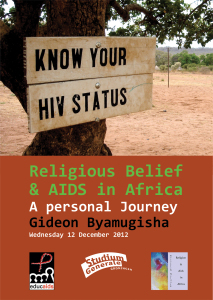Religion, AIDS and Africa

December 12th, AIDS activist and religious leader rev canon Gideon Byamugisha will give a public lecture in Groningen, starting off the conference “Biographies in Times of Crisis:Exploring Religious Narratives of AIDS in Africa and the African Diaspora”. In honor of World Aids day, we highlight his work and that of the organization he co-founded, INERELA+. By Kim Knibbe
Religion, AIDS and Africa seem to form a gloomy trio in the news, evoking images of generations dying too young while religious leaders fail to promote condoms and promote an atmosphere of taboo and denial around HIV/AIDS and sexuality. Another blog post on this weblog has already challenged these views. This story will challenge this stereotype even more strongly: a religious leader from Uganda who became a sexual health rights (HIV/AIDS) advocate after discovering he was HIV positive himself.Through sharing his own narrative about HIV/AIDS and encouraging others to share their experiences, Byamugisha has shown how these narratives can be an important tool in the fight against HIV/AIDS and the inequalities and injustices the epidemic brings to light. In Sub Sahara Africa, more than 22 million people are infected, more than 15 million children were orphaned because their parents died of AIDS.
How to deal with HIV/AIDS and sexual health rights is a thorny issue everywhere in the world, involving all areas of life and therefore morality. Religious organizations and leaders have often promoted a moral view of abstinence and monogamous relationships as the best way to prevent the spread of HIV/AIDS, battling against secular minded NGO’s that promote safe sex while claiming not to endorse any particular sexual morality. In Sub Sahara Africa, however, religion is of great importance to many people, providing a platform for engaging with the world, dealing with life’s everyday problems, shaping one’s life and ones social networks. In the fight against AIDS, religion can hardly be neglected.
At the time Byamugisha discovered that he was infected, HIV/AIDS was indeed a taboo among religious leaders, and he was at first advised to keep his HIV positive status to himself. Instead, he decided to be open about it, and created a platform for religious leaders living with, or personally affected by, HIV/AIDS in Africa (ANARELA+), and later internationally, INERELA+, with the slogan ‘positive faith in action’.
Interestingly, Byamugisha and the organizations he helped to found occupy a position on the crossroads in the discussion on HIV/AIDS from which they address both the sexual health rights and the moral and religious aspects of the issue.
Inarela+ has developed its own HIV/AIDS toolkit called, not unintentionally ones presumes, SAVE. According to their website, SAVE ‘tackles the stigma, shame, denial, discrimination, inaction and mis-action around HIV and AIDS, and comprehensively gives information related to HIV and methods of HIV transmission and how to mitigate these’.
In sum, rather than seeing religion as an obstacle to sexual health rights and the prevention of HIV/AIDS, this is a story where a religious leader from Africa has led the way in developing a response to the crisis of HIV/AIDS that has become an international standard.
To hear more about this, join us at the conference, visit the website of INERELA+, or come and listen to rev canon Byamugisha in Groningen!
Kim Knibbe is university lecturer in the sociology of religion at the faculty of Theology and Religious Studies in Groningen, and coordinator of the MA trajectory ‘Religion, Conflict and Globalisation’. Her most recent research is on Nigerian Pentecostal churches and networks in Europe.

